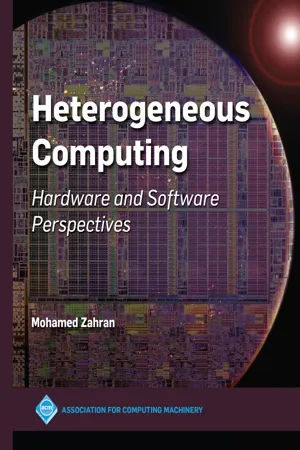
- 127 pages
- English
- ePUB (mobile friendly)
- Available on iOS & Android
About this book
If you look around you will find that all computer systems, from your portable devices to the strongest supercomputers, are heterogeneous in nature.
The most obvious heterogeneity is the existence of computing nodes of different capabilities (e.g. multicore, GPUs, FPGAs, …). But there are also other heterogeneity factors that exist in computing systems, like the memory system components, interconnection, etc. The main reason for these different types of heterogeneity is to have good performance with power efficiency.
Heterogeneous computing results in both challenges and opportunities. This book discusses both. It shows that we need to deal with these challenges at all levels of the computing stack: from algorithms all the way to process technology. We discuss the topic of heterogeneous computing from different angles: hardware challenges, current hardware state-of-the-art, software issues, how to make the best use of the current heterogeneous systems, and what lies ahead.
The aim of this book is to introduce the big picture of heterogeneous computing. Whether you are a hardware designer or a software developer, you need to know how the pieces of the puzzle fit together. The main goal is to bring researchers and engineers to the forefront of the research frontier in the new era that started a few years ago and is expected to continue for decades. We believe that academics, researchers, practitioners, and students will benefit from this book and will be prepared to tackle the big wave of heterogeneous computing that is here to stay.
Tools to learn more effectively

Saving Books

Keyword Search

Annotating Text

Listen to it instead
Information
Table of contents
- Cover
- Half Title
- Title Page
- Copyright Page
- Dedication
- Contents
- Preface
- Chapter 1 Why Are We Forced to Deal with Heterogeneous Computing?
- Chapter 2 Different Players: Heterogeneity in Computing
- Chapter 3 Architecture: Heterogeneity in Design
- Chapter 4 Programmability
- Chapter 5 Research Directions
- References
- Index
- Author‘s Biography
Frequently asked questions
- Essential is ideal for learners and professionals who enjoy exploring a wide range of subjects. Access the Essential Library with 800,000+ trusted titles and best-sellers across business, personal growth, and the humanities. Includes unlimited reading time and Standard Read Aloud voice.
- Complete: Perfect for advanced learners and researchers needing full, unrestricted access. Unlock 1.4M+ books across hundreds of subjects, including academic and specialized titles. The Complete Plan also includes advanced features like Premium Read Aloud and Research Assistant.
Please note we cannot support devices running on iOS 13 and Android 7 or earlier. Learn more about using the app